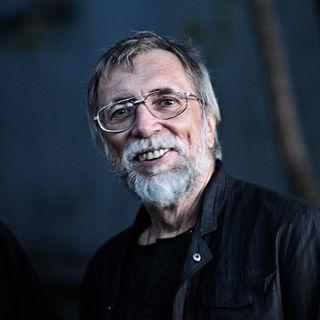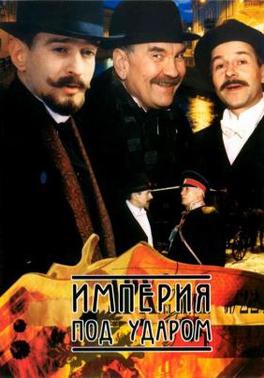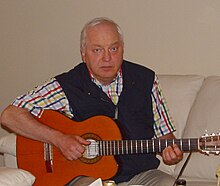The term bard came to be used in the Soviet Union in the early 1960s, and continues to be used in Russia today, to refer to singer-songwriters who wrote songs outside the Soviet establishment, similarly to folk singers of the American folk music revival. Because in bard music songwriters perform their own songs, the genre is also commonly referred to as author song or bard song.

Sergei Alexandrovich Yesenin, sometimes spelled as Esenin, was a Russian lyric poet. He is one of the most popular and well-known Russian poets of the 20th century. One of his narratives was "lyrical evocations of and nostalgia for the village life of his childhood – no idyll, presented in all its rawness, with an implied curse on urbanisation and industrialisation".
![<i>Moscow Does Not Believe in Tears</i> 1980 [[Soviet Union]] film](https://upload.wikimedia.org/wikipedia/en/a/a3/Moscow_for_US.jpg)
Moscow Does Not Believe in Tears is a 1980 Soviet romantic drama film made by Mosfilm. It was written by Valentin Chernykh and directed by Vladimir Menshov. The leading roles were played by Vera Alentova and Aleksey Batalov. The film won the Academy Award for Best Foreign Language Film in 1981.
Nikitin, or Nikitina is a common Russian surname that derives from the male given name Nikita and literally means Nikita's. It may refer to:

Viktor Semyonovich Berkovsky was a Soviet and Ukrainian Jewish bard.

Tatyana Khashimovna Nikitina is a prominent Russian bard. She usually performs together with her husband, Sergey Nikitin.

Ivan Savvich Nikitin was a Russian poet.

Gregory Alchevsky was a Ukrainian composer. Alchevsky was born in Kharkiv, Ukraine, then in the Russian Empire, the son of the wealthy industrialist and banker Aleksey Alchevsky, and his wife Khrystyna Alchevska, a teacher who was a prominent activist for national education in Imperial Russia. Their six children were all musically gifted.

Vladimir Ivanovich Martynov is a Russian composer, known for his compositions in the concerto, orchestral music, chamber music, and choral music genres.

Tatiana Nikolaevna Kotova is a Russian singer, actress, tv host and beauty pageant titleholder. She is the winner of the title Miss Russia 2006 and former soloist of Ukrainian female pop group Nu Virgos.
Viktor Arkhipovich Luferov was a Russian singer-songwriter, multi-instrumentalist, poet, and performer. His songs were examples of the Russian music genre author song.

Yakov Vladimirovich Flier was a Soviet concert pianist and teacher.

Galina Khomchik is a Russian singer, acoustic guitarist and pianist, a prominent figure of the country's modern folk/bard movement. Khomchik, the three Soviet bard festivals' laureate and a XX Workers' Festival's golden medal winner. A popular radio and TV presenter, she was the author of the TV series I'll Sing To You and Let's Fill With Music... and filmed an eight-part TV film on the history of the bard movement in the USSR. Khomchik is known also as director and producer of many musical videos, including those of the pop bard Oleg Mityaev. Both on her own and as a member of an all-star project Songs of Our Century she toured Europe, Australia, Israel and USA

Lyudmila Ivanovna Ivanova was a Soviet and Russian film and stage actress, People's Artist of the RSFSR (1989). She was awarded the Order of Honour and the Order of Friendship. She composed many songs for the guitar.

The State Duma of the Federal Assembly of the Russian Federation of the 5th convocation is a former convocation of the legislative branch of the State Duma, lower house of the Russian Parliament. The 5th convocation met at the State Duma building in Moscow, worked from December 24, 2007 to December 21, 2011.

Empire under Attack is a 12-episode 2000 Russian miniseries, about the confrontation of the Security Department and the SR Combat Organization at the beginning of the 20th century.
Many adaptations of Rudyard Kipling's Just So Stories have been made in various countries, as cartoons, musicals and a children's opera.
Viktor Nikolaevich Nikitin was a Russian writer, playwright and editor. He was a member of the Union of writers of Russia.


![<i>Moscow Does Not Believe in Tears</i> 1980 [[Soviet Union]] film](https://upload.wikimedia.org/wikipedia/en/a/a3/Moscow_for_US.jpg)










